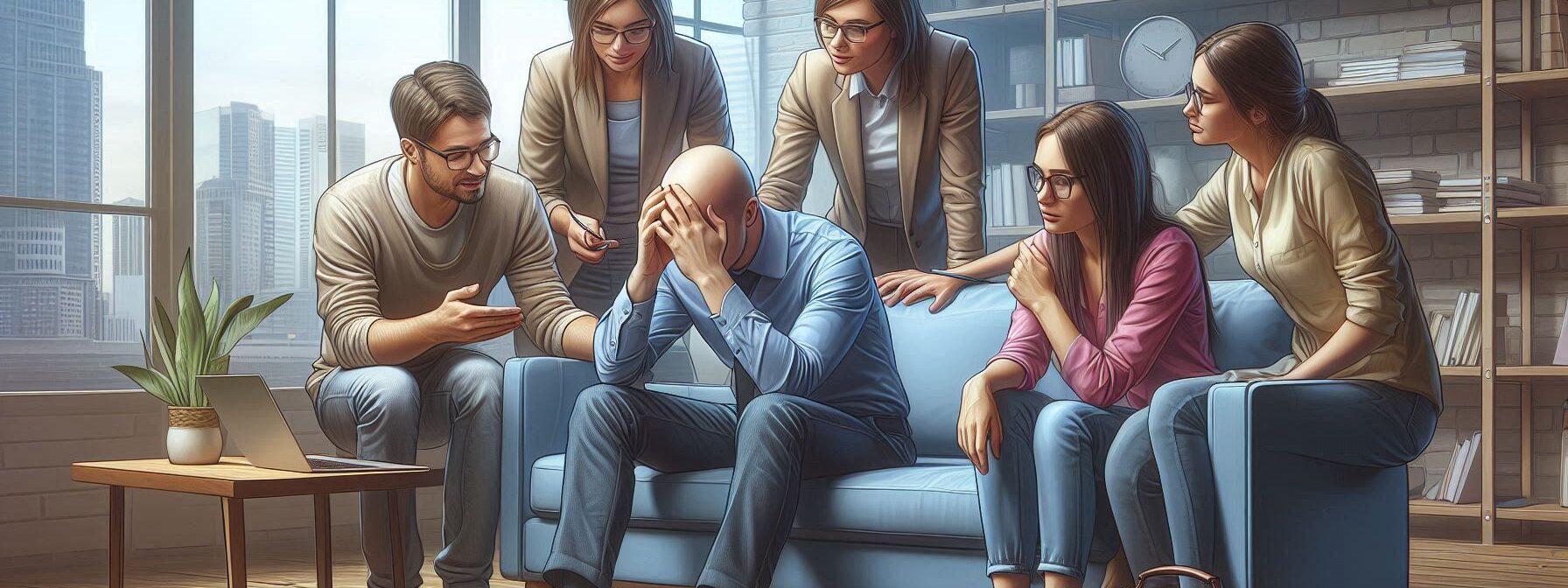When it comes to mental health, men often find themselves caught in a tricky situation—like trying to fold a fitted sheet.
You know it’s complicated, and you’re not quite sure where to start. Society has this funny way of telling us that men should be tough, stoic, and impervious to emotional turmoil.
But let’s face it: even the toughest of us can feel like we’re wading through molasses when depression hits.
So, let’s dive into the murky waters of depression in men and explore how we can break down those pesky barriers preventing us from seeking help.
Top Takeaways and Key Concepts
- Challenge the “tough guy” stereotype by recognizing vulnerability as a sign of strength.
- Acknowledge fear and stigma as barriers to seeking help and confront them proactively.
- Reach out to supportive spaces, like men’s groups, to share feelings safely.
- Promote open conversations and positive role models to normalize men discussing mental health.
- Utilize available resources, including therapy and mental health organizations, for guidance and support.
Summary of This Article
Please Note: This post may contain affiliate links. If you click one of them, we may receive a commission at no extra cost to you. As an Amazon Associate, I earn from qualifying purchases.
This article explores the unique challenges men face with depression, emphasizing how societal expectations often discourage vulnerability and seeking help. It highlights the role of fear and stigma in preventing men from opening up and underscores the importance of supportive spaces and peer groups where men can safely share experiences. The piece advocates changing the narrative by promoting positive male role models who discuss mental health openly and humorously. Practical steps include accessing professional help, therapy, and mental health organizations to empower men to take control of their well-being without feeling their masculinity is compromised.
The Tough Guy Myth

By the way, have you ever noticed how many action movies feature tough guys who never show an ounce of vulnerability?
It’s like Hollywood decided that showing emotions is as taboo as wearing socks with sandals (which I think is totally acceptable if done right).
The “tough guy” stereotype has led many men to believe they need to keep their feelings bottled up tighter than a jar of pickles after Thanksgiving dinner.
Let me introduce you to Dave—a regular guy who spent years thinking he had to be the strong one for his family.
He was convinced that admitting he felt sad or anxious would somehow diminish his masculinity. Spoiler alert: it didn’t! One day, while watching a sappy commercial about puppies (seriously, those things get me every time), he realized that being vulnerable doesn’t make you weak; it makes you human.
Interestingly enough, when Dave finally opened up about his struggles with depression during a game night with friends, he discovered that several others were fighting similar battles.
Who knew that sharing your feelings could lead to bonding over nachos and existential crises?
The Fear Factor
Honestly, fear plays a massive role in why many men avoid seeking help for depression. It’s like standing on the edge of a diving board—you know you should jump in but worry about belly-flopping instead.
What will people think? Will they judge me? Will my buddies still invite me over for pizza?
Take Mike’s story as an example. He was terrified of what might happen if he admitted he needed help.
Would his friends suddenly see him as “that guy”? However, after some soul-searching (and maybe some googling at 2 AM), Mike realized that seeking help actually takes courage—not just running into a burning building or eating an entire pizza by yourself.
In fact, once Mike took the plunge and reached out for therapy, he found himself feeling lighter than air—like someone had removed an elephant from his shoulders (not literally; elephants are heavy!).
He learned that opening up about mental health challenges isn’t just okay; it’s downright liberating!
Finding Supportive Spaces
Speaking of reaching out for help—let’s talk about supportive spaces! It turns out there are places specifically designed for men struggling with depression where they can share their experiences without judgment or fear of being served broccoli juice smoothies.
For instance, there are support groups tailored just for guys who want to discuss their feelings while also enjoying snacks (because let’s be honest: food makes everything better).
These groups provide an opportunity for camaraderie among individuals facing similar challenges—and no one judges anyone else for crying into their chips!
Consider Tom—a man who thought attending such a group would be akin to entering a gladiator arena filled with overly emotional warriors wielding tissues instead of swords.
Instead, he found laughter and understanding among fellow attendees who shared stories ranging from heartbreaks over lost sports teams to navigating fatherhood amidst chaos.
Changing the Narrative
All things considered, changing the narrative around men’s mental health is crucial if we want more guys like Tom and Mike stepping forward without hesitation.
We need society—yes, even Aunt Edna—to recognize that asking for help doesn’t mean losing your man card; rather it means gaining access to tools needed for navigating life’s bumpy roads.
By highlighting positive male role models who openly discuss their struggles with mental health—think actors or athletes—we can create conversations around vulnerability being strength instead of weakness!
Imagine seeing your favorite superhero talking about therapy sessions between saving cities—it would make them more relatable!
Let’s also remember humor plays an essential role here too! Sharing laughs while discussing serious topics helps break down walls faster than any motivational poster ever could.
Resources Available
Now let’s not forget practical steps toward getting help! If you’re reading this and thinking maybe it’s time I reach out—or perhaps you have a friend who needs encouragement—there are countless resources available:
1. National Alliance on Mental Illness
https://www.nami.org
2. Men’s Health Network
https://www.menshealthnetwork.org
3. The Anxiety & Depression Association of America
https://adaa.org
4. Mental Health America
https://www.mhanational.org
5. Talkspace
https://www.talkspace.com
These organizations offer information on local support groups or online services where guys can chat anonymously without worrying about judgmental glances from Aunt Edna!
In conclusion: yes, depression can feel overwhelming at times—but remember that seeking help doesn’t mean surrendering your identity as a man; rather it signifies taking charge of your well-being!
Let’s embrace vulnerability together because life is too short not to laugh through our tears sometimes—and hey…if all else fails…there’s always pizza!
Frequently Asked Questions
Why is depression in men often overlooked?
Depression in men is frequently overlooked because societal expectations encourage men to appear strong and hide emotional struggles, making symptoms harder to recognize.
What are common barriers that prevent men from seeking help?
Fear, stigma, and the belief that vulnerability equals weakness often keep men from reaching out for support or acknowledging depressive symptoms.
How does the “tough guy” stereotype affect men’s mental health?
This stereotype pressures men to suppress emotions, which can worsen depression and create feelings of isolation or shame around seeking help.
What supportive spaces are available for men with depression?
Men can access support groups, peer communities, and safe discussion spaces designed specifically for sharing experiences without judgment.
Can talking with others really help men cope with depression?
Yes. Open conversations allow men to realize they are not alone, reduce emotional burden, and learn from others facing similar challenges.
How can society help normalize men seeking mental health support?
Promoting positive role models, encouraging open dialogue, and challenging outdated beliefs about masculinity help normalize seeking help.
What professional resources are available for men dealing with depression?
Therapists, counselors, and mental health organizations offer confidential support, treatment options, and guidance tailored to individual needs.

Kevin Collier is a passionate mental health advocate and writer for SadFAQ.com, where he explores the complexities of depression and mental well-being. With a deep understanding of mental health challenges, Kevin provides compassionate insights and practical advice to help individuals navigate their journeys toward healing. His articles aim to destigmatize mental health issues, offering support and resources for those seeking to improve their emotional resilience. Committed to raising awareness and fostering open conversations, Kevin’s work empowers readers to prioritize their mental health and seek the support they deserve.




